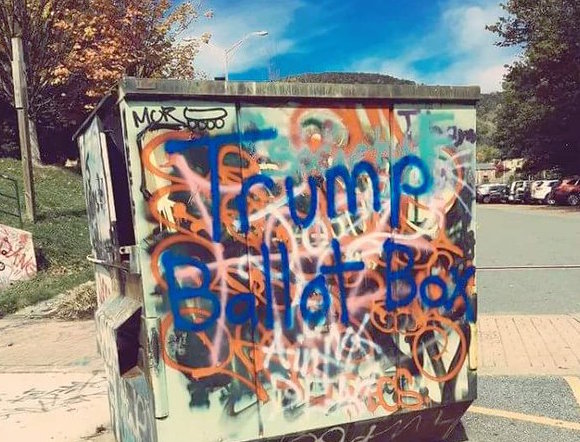Donald Trump’s strong statements and loose tongue may be tying those of the college students who support him.
Many local college students who back Trump express reluctance to voice their allegiance on college campuses. Unlike other candidates running for a party nomination, college Democrats condemn Trump for his conservative views while many college Republicans reject him for not being conservative enough.
Instead, he garners his support primarily from moderate Republicans who like Trump’s “brutal honesty”, immigration policy, and his status as a Washington outsider, according to Kevin Mullinix, a professor of government and justice studies at Appalachian State University. After reviewing papers for his classes, he estimates that a sizable amount of his students agree with Trump and many of his stances, particularly on immigration.
“He’s sold himself very well on these things and he’s very good at capitalizing on issues at the right time,” he said.
Trump is even projected to win North Carolina’s primary election.
But despite the support his students cite for Trump in their assignments and moderated in-class discussion, it is rare to find anything but anger or derision towards his vocal supporters on college campuses.
In response to a question to Yik Yak (an anonymous social media platform) asking how students would react upon discovering that a classmate supported Trump, one user recommended against it adding, “It’s dangerous. College libs will try to ruin your reputation and career prospects out of spite.” A student in the Student Government Association even suggested that Trump supporters could be found “in the sewers.”

Graffiti near Edwin Duncan Hall seen in October 2015
“There’s definitely been a lot of negative backlash,” said Emily Montgomery, a 22-year-old political science major. “I took a picture of me wearing a volunteer badge and a Trump hat and a friend commented on my Facebook and said ‘Congratulations you’re working for a bigot.’ I could see how people would be nervous to say that [they support Trump].”
Even at campuses situated in some of North Carolina’s most conservative areas, Trump supporters still face judgment from peers on campus, sometimes in person, but more often on social media.
“It’s through Twitter messages, or even more commonly, we get attacked through our email,” Ryan Fournier, a student and Trump organizer at Campbell University said.
Samuel Johnson, a 19-year-old freshman at Lenoir Rhyne and communications director for Students for Trump added, “If you support Trump you’re labeled as a racist or a bigot. I think that the liberals and the liberal media are good at labeling people.”
With pressure coming from the political left and right, it’s difficult for these students to share their views. As political fervor increases in the coming months, Trump’s collegiate supporters may have to develop a thick skin and look to polling numbers, not campus peers, for support.
Produced for COM2610 at Appalachian State University.